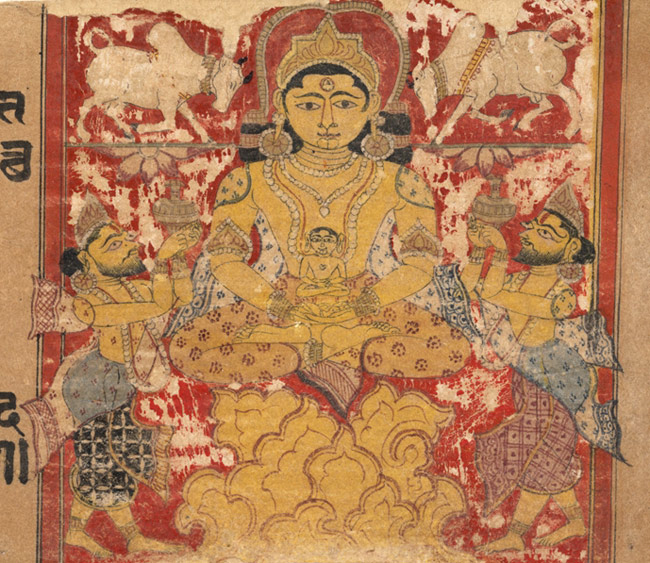
This article was published in July 1948 in The Jaina Gazette (Volume XLV, No. 7, p. 67).
Prehistoric History - Jain Puranic Literature
The first, or elementry course of studies for beginners in Jainism is called Pratharnanuyoga. It is also known as Puranic literature or traditional lore. It may also be called ancient history.
The oldest Puran or traditional history, which is held in high respect by Jains is a voluminous scripture. The original text was composed in the 9th century, in Sanskrit verses, by Acharya Jinasena. The Sanskrit text, comprising 47 cantos and 10890 verses, has been printed, in recent years, with a Hindi translation.
The first canto is preliminary and contains general observations. The second is devoted to scriptural details. The third describes the cycles of time. The fourth gives geographical details and a description of what may be called the golden age.

Cantos fifth to eleventh deal with the eight previous lives of Rishabhadeva, the first Tirthankara, alternating between high positions in mundane and celestial regions. The twelfth canto describes the city of Ayodhya and Marudevi, the mother of Rishabhadeva. His birth is celebrated in the 13th and 14th cantos.
The 15th describes his marriage and the birth of his eldest son. The 16th canto deals with the births of other sons and two daughters and his coronation. The 17th describes his renunciation of the kingdom. The 18th and 19th give an account of his ascetic practices, of the inability of his companions to observe the same and their relapse to secular occupations.
Cantos 20 and 21 narrate the offering of sugarcane juice by king Shreyans to Rishabhadeva, his deep meditation, advancement in spiritual stages, and the attainment of Omniscience. Cantos 22 to 25 give a description of the open court of the Tirthankara, the audience, the discourses and the panegyrics offered by devotees.
Cantos 26 to 32 describe the preparation for and conquest of various provinces and countries, and a triumphal march by Rishabhadeva's son Emperor Bharata Chakravarty. The return of Bharata to Ayodhya after the conquests and his visit to Kailash, where the Court of Bhagwan Rishabhadeva was being held, are described in canto 33. The fraternal contest between Bharata and Bahubali and renunciation of his kingdom by the latter are described in cantos 34 to 36.
Canto 37 narrates the imperial coronation of Bharata, Cantos 38 to 40 deal with the rituals to be observed on domestic occasions and celebrations. Cantos 41 and 42 deal with the duties of-kings and subjects. Cantos 43 to 47 deal with the custom of the Svayamvara (chosing a husband by a maiden) and die contest between Jaya Kumar and Arkkirti son of Emperor Bharata.
The scripture concludes with a discourse by Rishabhadeva and a description of his liberation from transmigrations and attainment of moksha, eternal life, immortality and bliss.
This book is called Adipurana. Its companion volume called Uttarpurana (later ancient history) deals with the lives of the other Tirthankaras and of 39 other high personages of the current cycle of time. Uttarpurana was composed by Acharya Gunabhadra, chief disciple of Acharya Jinasena. The two together constitute Mahapurana. Beside these two, there are other traditional histories such as Parshvapurana, Vardhamanpurana, Munisubratapurana and other minor works of ancient history.